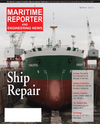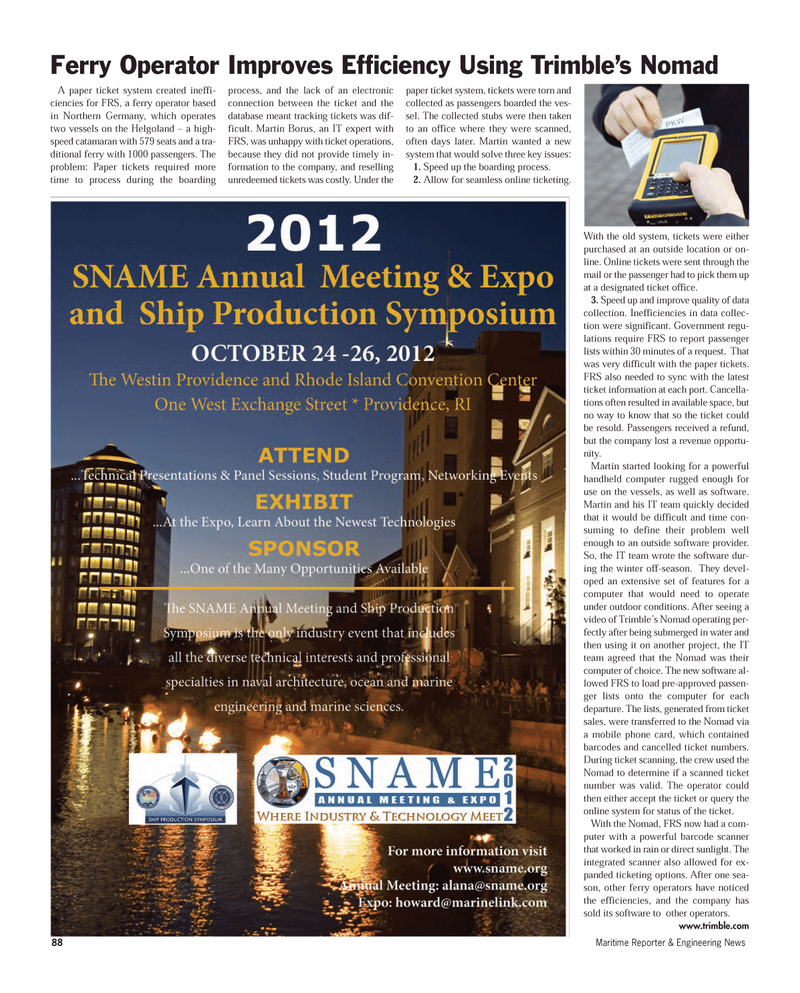
Page 88: of Maritime Reporter Magazine (March 2012)
The Ship Repair Edition
Read this page in Pdf, Flash or Html5 edition of March 2012 Maritime Reporter Magazine
A paper ticket system created ineffi- ciencies for FRS, a ferry operator basedin Northern Germany, which operates two vessels on the Helgoland ? a high- speed catamaran with 579 seats and a tra-ditional ferry with 1000 passengers. The problem: Paper tickets required more time to process during the boardingprocess, and the lack of an electronicconnection between the ticket and the database meant tracking tickets was dif- ficult. Martin Borus, an IT expert with FRS, was unhappy with ticket operations, because they did not provide timely in- formation to the company, and reselling unredeemed tickets was costly. Under the paper ticket system, tickets were torn and collected as passengers boarded the ves- sel. The collected stubs were then taken to an office where they were scanned, often days later. Martin wanted a new system that would solve three key issues: 1. Speed up the boarding process. 2. Allow for seamless online ticketing. With the old system, tickets were either purchased at an outside location or on-line. Online tickets were sent through the mail or the passenger had to pick them upat a designated ticket office. 3.Speed up and improve quality of data collection. Inefficiencies in data collec- tion were significant. Government regu- lations require FRS to report passengerlists within 30 minutes of a request. That was very difficult with the paper tickets. FRS also needed to sync with the latestticket information at each port. Cancella- tions often resulted in available space, but no way to know that so the ticket could be resold. Passengers received a refund, but the company lost a revenue opportu- nity. Martin started looking for a powerful handheld computer rugged enough foruse on the vessels, as well as software. Martin and his IT team quickly decidedthat it would be difficult and time con- suming to define their problem well enough to an outside software provider. So, the IT team wrote the software dur- ing the winter off-season. They devel- oped an extensive set of features for a computer that would need to operate under outdoor conditions. After seeing a video of Trimble?s Nomad operating per- fectly after being submerged in water and then using it on another project, the ITteam agreed that the Nomad was their computer of choice. The new software al- lowed FRS to load pre-approved passen- ger lists onto the computer for eachdeparture. The lists, generated from ticket sales, were transferred to the Nomad viaa mobile phone card, which containedbarcodes and cancelled ticket numbers. During ticket scanning, the crew used the Nomad to determine if a scanned ticket number was valid. The operator could then either accept the ticket or query the online system for status of the ticket. With the Nomad, FRS now had a com- puter with a powerful barcode scanner that worked in rain or direct sunlight. The integrated scanner also allowed for ex- panded ticketing options. After one sea- son, other ferry operators have noticed the efficiencies, and the company has sold its software to other operators. www.trimble.com 88Maritime Reporter & Engineering News Ferry Operator Improves Efficiency Using Trimble?s Nomad MR March 12 # 11 (81-88):MR Template 3/6/2012 1:26 PM Page 88

 87
87

 89
89
